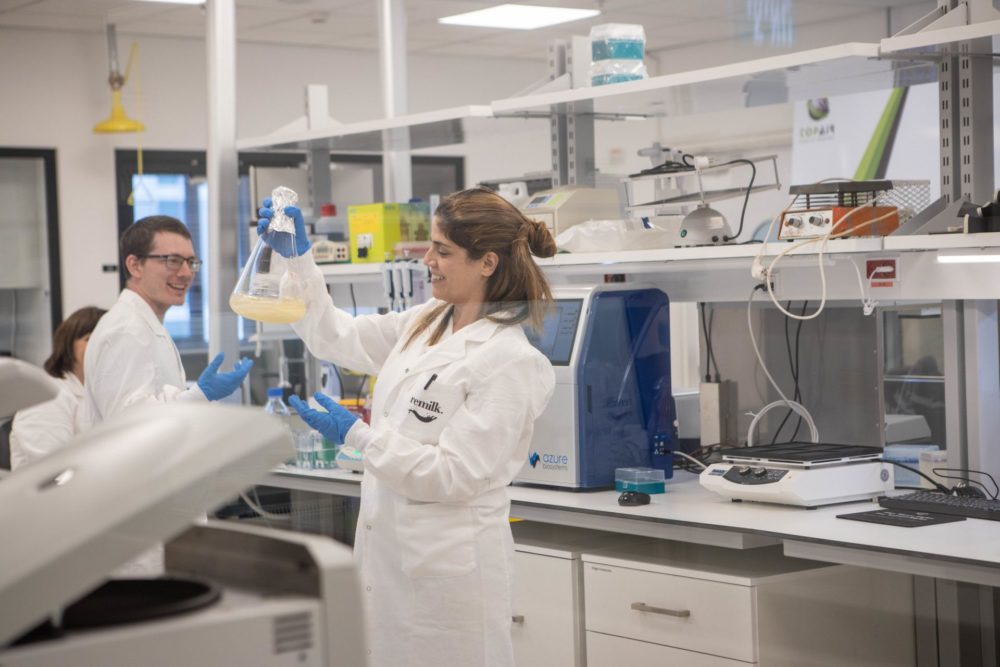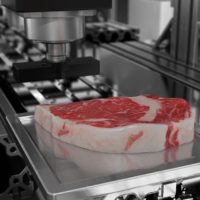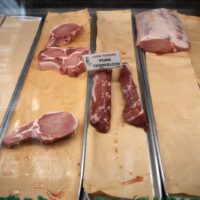
Image source: Remilk
Every week we track the business, tech and investment trends in CPG, retail, restaurants, agriculture, cooking and health, so you don’t have to. Here are some of this week’s top headlines.
In grocery news, Foxtrot has closed a $100 million funding round that will allow it to expand to 50 new locations and grow its private label lineup. Meanwhile, grocery workers across the US are again facing the dire consequences of working on the front lines amid another Covid outbreak. Over 8,000 Kroger workers are on strike, accusing the corporation of making big profits during pandemic while not paying employees enough.
In other news, Israeli startup Remilk has raised $120 million for its cow-free milk. Mycoprotein has raised $125 million to begin mass production of its vegan leather.
Our newsletter takes a lot of time and resources to produce. Make a one time or monthly contribution to help us keep it going. Whether it’s $5 or $500, every bit helps and shows us that you value our work.
Check out our weekly round-up of last week’s top food startup, tech and innovation news below or peruse the full newsletter here.
1. Israeli Food Tech Startup Remilk Raises $120M Investment for Cow-Free Milk – The Times of Israel
The company produces milk proteins via a fermentation process that renders them “chemically identical” to those present in cow-produced milk and dairy products.
2. What 25 Leading FoodTech Investors Are Watching In 2022? – FoodHack
From side stream valorization to democratized nutrition, 25 foodtech VC’s, angels and corporates on what they’re excited by in 2022.
3. Flush with New Capital, Foxtrot’s ‘Convenience Store of the Future’ Is Coming to a Location Near You – TechCrunch
The company just picked up $100m to expand its footprint to 50 new retail locations in the next two years. It also expects 200 new private label products to be launched over the next year.
4. We Have People Living Out of Their Cars’: 8K Kroger Workers Strike Over Wages – The Guardian
Workers at nearly 80 grocery stores accuse the corporation of making big profits during pandemic while not paying employees enough.
5. Starfield Scoops $100M in China’s Biggest Ever Vegan Protein Funding Round – Green Queen
To boost production, a new large-scale manufacturing plant is being constructed to produce hundreds of vegan meat variations and bring everything in-house. The company currently supplies 14k outlets.
6. Grocery Stores Cut Hours, Services as Omicron Infects Workers – Wall Street Journal
Across the country, supermarket employees are calling out sick after contracting Covid-19 or getting exposed to the virus, prompting retailers to manage operations with fewer staffers, while shopper demand for groceries remains high.
7. A Quandary for New York Restaurants and Workers: What to Do About Omicron? – New York Times
Without hard rules about employees who test positive, owners and workers are weighing safety against finances, and not always agreeing on the answer.
8. Omicron Is Threatening the Survival of US Restaurants – Bloomberg
US restaurants stayed afloat during the pandemic thanks to outdoor heaters, elaborate patio spaces, and to-go drinks. But the creative workarounds weren’t enough to stem the losses from the recent omicron-fueled surge of Covid cases.
9. MycoWorks, Making Leather from Fungi, Closes $125M to Scale Production – TechCrunch
Funding will help the company move beyond major global luxury brands and into mass scale production. The company touts its Fine Mycelium process as the only mycelium engineered to be made-to-order and made-to-specification.
10. Ireland: Online Ordering Company Flipdish Raises $100M – Restaurant Business
The company offers branded mobile apps and websites, QR code ordering and payment, and marketing tools. It works with thousands of restaurants in 25 countries including the US.
11. US Online Grocery Sales Hit Nearly $100B in 2021 Becoming a ‘Pickup-Dominant Market’ – Food Navigator
Total US online grocery sales for 2021 reached $97.7b as more than 70% of households shopped online at least once during the year, heavily preferring pickup services to delivery.
12. Indonesia’s eFishery Raises $90M from Temasek, SoftBank Vision Fund 2 and Sequoia Capital India – TechCrunch
The company provides feeding devices, software and financing for fish and shrimp farmers. Funds will be used to scale up and expand into the top 10 countries for aquaculture, including China and India.
13. Upward Plans to Open a 250K-Sq-Ft Vertical Farm in PA Early Next Year – TechCrunch
The farm will specifically focus on aquaponically-farmed microgreens and bass. Upward aims to begin sales from the farm in early 2023.
14. Israel: Plantish Unveils Whole Cut, Plant-Based Salmon Prototype – Food Navigator
Out of stealth mode, Plantish has unveiled a fully-structured, boneless vegan salmon prototype that it says rivals the taste, nutrition and complex structure of conventional salmon.
15. Israel’s Biggest Food Maker Enters JV to Put ‘Affordable Cultured Food on the Table’ – Food Navigator
Tnuva has partnered with cell production firm Pluristem to bring cultured food, starting with a raw meat product, to the masses.
16. Netherlands: Fooditive Unveils Vegan Casein Derived from Precision Fermentation – Food Ingredients First
The ingredient is the first vegan casein made available for applications in the food industry. Several food developers and companies have subscribed to test the component in their products.
Our newsletter is the absolute easiest way to stay on top of the emerging sector, so sign up for it today and never miss the latest food tech and innovation news and trends, Already signed up? Share the love with your friends and colleagues!





